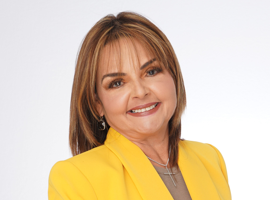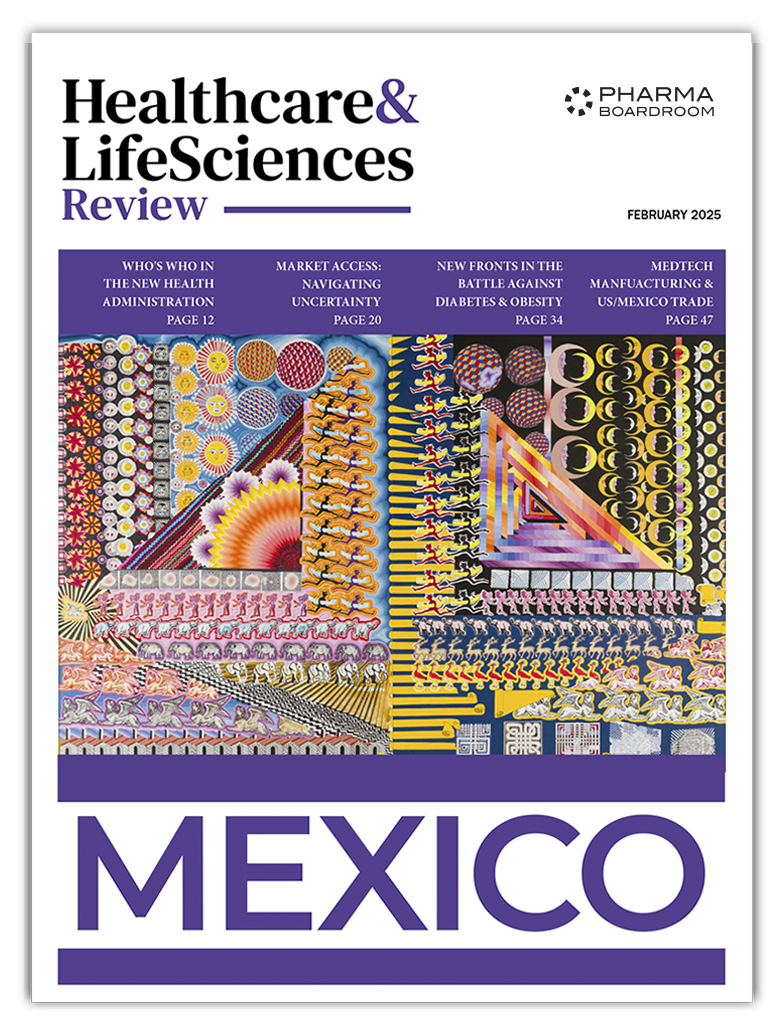Ivelisse Casillas, founder of PMC Health Group, formerly Pharmacon, leads a team of 20 in delivering integrated healthcare communications. The company, specialising in digital marketing and transcultural strategies, has expanded beyond pharmaceuticals to serve the broader health sector. With a focus on the US Hispanic market, PMC helps clients engage with patients and healthcare providers through culturally relevant messaging.
Pharmacon has rebranded as PMC Health Group. What led to this rebranding, and how does it reflect your current vision?
After 25 years in the market, during which we established ourselves as pharmaceutical experts, we recognised the need to expand our vision. Today, we are embracing a broader scope within the health industry, not just pharmaceuticals. That shift is central to our current direction. We have also opened an office in Florida and now serve clients in South Florida as well. This transition is about capitalising on our 25 years of experience to solidify our position as the only healthcare and marketing communications company in Puerto Rico.
We celebrated this last February our 25th anniversary with our clients, the feedback was overwhelmingly positive. I was genuinely surprised. Pharmacon had a rather stiff, conventional image. Now, we are presenting ourselves as more creative, adaptable, social, and engaged — and we are very much in that era now, so we need to reflect that.
What new services does PMC Health Group offer today, and how do these differ from Pharmacon’s original remit?
Our transformation is a response to the evolving dynamics in the market. The COVID-19 pandemic marked a real turning point, particularly in how the pharmaceutical industry approached digital communications. Previously, most promotional efforts focused on traditional methods such as primarily face-to-face visits with physicians. But the realities of lockdowns and limited access to healthcare facilities made digital communications essential.
Digital marketing has now become our core growth strategy. While we had previously considered patient communications, today we have tools that allow for direct engagement with healthcare providers and doctors. These interactions are highly targeted, enabling us to strengthen our industry presence by reaching different, very specific audiences.
Digital media is playing an increasingly significant role in healthcare marketing, but engagement remains heavily regulated. How do you navigate this complexity?
That is one of our key strengths and perhaps our most significant. To be effective in this space, you must thoroughly understand both the industry and its regulations. For example, you might hire an agency that specialises in consumer products, but when they attempt to launch a pharmaceutical campaign, it could take over a year just to get it approved—if it even gets approved at all.
We have the in-house knowledge, capabilities, and experience to do things far more efficiently. If you tell us you need a campaign ready in three months, you will have it. We know how to navigate the medical-legal review process in a streamlined manner. We do not overpromise, but at this stage, we can confidently say that we have the expertise to deliver within tight timelines.
How has the relationship with physicians evolved, especially in Puerto Rico, where an older demographic may pose challenges in adopting digital tools?
We were commissioned by the Pharmaceutical Industry Association of Puerto Rico to study this issue, and we were the agency responsible for all the communications and message delivery. It is not only a Puerto Rican issue—it is a global one. In five years, around 50% of our physicians will be retiring, and there are not enough new doctors entering the field to replace them.
That said, whether you engage them digitally or in person does not change the core issue. The true challenge lies in gaining access to doctors and ensuring medication availability. While marketing strategies evolve, they do not solve the shortage of healthcare professionals. That is the real problem.
Since Puerto Rico is part of the United States, the same healthcare regulations apply here. Our physicians have a National Provider Identifier (NPI) number, which is a unique identifier akin to a Social Security number for healthcare providers. If a doctor writes a prescription, that NPI number must be included.
At PMC, we have the HCP Engagement Tool, a programmatic system that specifically targets these NPI numbers, whether they are from Puerto Rico or the United States. For example, if you are a nephrologist, you will only receive communications relevant to your speciality. It is highly targeted, which is critical in marketing, as segmentation is key. Instead of sending a campaign to all 10,000 physicians in Puerto Rico, we can identify the 100 nephrologists and engage only them.
You describe yourselves as an integrated healthcare communications agency. How does this model meet the evolving needs of your clients?
We operate on a 360-degree model, integrating all components required to promote or market a pharmaceutical product. It is one of the most challenging aspects of our business because the patient journey involves so many players. There is the physician, of course, but also the insurance provider, the patient, the caretaker, the pharmacy, and the pharmacy benefit manager. Additionally, office staff often act as gatekeepers, managing whether a prescription reaches a specialised pharmacy.
Here at PMC, we connect all those dots. Speaking only to the physician is ineffective if the insurance does not cover the product or if the patient is not informed or motivated to follow the treatment. Everyone in the chain must be aligned—only then is the communication truly effective.
That full integration is what sets us apart. It allows us to navigate the complexity with agility and precision, which many in the industry struggle to achieve.
Are there any particular initiatives that you are excited about to further cement PMC’s position?
As part of our 25th anniversary, we are taking the opportunity to give back. We are working more closely with patient organisations, providing them with tools to enhance communication, improve advocacy, and become more effective with their limited resources. For example, we have also launched the PMC Lecture Series—quarterly communications designed to equip these groups with essential knowledge. We are even offering pro bono support to some of them as we are truly committed to being there alongside them.
What is the current status of PMC’s international expansion efforts?
We have no immediate plans to expand further into Latin America. We closed our office in Colombia after COVID-19 due to the difficulties in travel and maintaining business operations effectively. We have chosen to concentrate our efforts on our Florida office and our base here. Mexico remains a potential market, as it is very large, but it is not an easy one. I have extensive experience working across Latin America, and I can say from experience that Mexico is even more challenging than Brazil.
Brazil may be complicated due to language and cultural differences, but from a business perspective, it is less difficult than Mexico. I know everyone sees Mexico’s 120 million population and sees opportunity, but it is not so simple.
Looking ahead, what are your aspirations for PMC Health Group over the next five years?
Over the years, our service offering has become more precise, more effective, and more sophisticated. Early on, clients may not have fully grasped the value of what we offered. But today, it is evident—we make a tangible difference. Our future lies in continuing to diversify, particularly into the US Hispanic market. It is a major opportunity. It is now the largest minority group in the mainland United States. While English is the official language, Spanish is the second most spoken language in the US. When it comes to healthcare, people want to hear information in their native language. It creates trust and understanding.
The Hispanic population is a key demographic in the US, yet often feels underserved. Are pharmaceutical companies truly engaging this community in a culturally meaningful way?
To be perfectly honest, I do not believe there is a significant shift in how pharmaceutical companies are engaging with the Hispanic population. In most cases, they are simply translating existing materials into Spanish — but that alone is not enough. What is missing is what we refer to as transculturalisation: the thoughtful integration of cultural nuances into the messaging. Instead, what we see is plain translation — the same advertising content, directly converted into Spanish, with no adaptation.
For the Hispanic community, however, that cultural connection, the emotion, the tone, and the engagement are absolutely vital. That is where we come in. When a company provides us with a brief, we do not just translate it — we add what I like to call our “seasoning.” We tropicalise the content, making it culturally relevant, emotionally resonant, and far more effective.
On a more personal note, what drives you to keep reinventing yourself? What keeps you going?
I am extremely passionate about what I do. For me, this is not merely a job — it is a way of life. I love the health sector. I understand its vital importance. You often do not realise just how critical health is until you no longer have it.
That awareness fuels my desire to keep evolving — to discover new ways of communicating with patients, of negotiating with clients, of remaining relevant. I invest in training our people so that every interaction with a client brings fresh ideas and creativity. No two days are the same in this line of work. Each day, you must reinvent yourself. And of course, we face intense competition, inflation, and economic challenges — reinvention is necessary if you want to remain relevant.
Additionally, it is my eldest son who continues to inspire me — he was the reason I started this journey. As Pharmacon has evolved through various stages of growth, so too has my son. He is now an adult with autism and his own specific needs. That remains my primary motivation.
Over the years, the team here has become another key source of inspiration. We are a team of 20 people, and some of my colleagues have been with me for many years. PMC, under my leadership, has worked with 13 of the 15 largest pharmaceutical companies in the world. That is an immense source of pride for us. That longevity is a real competitive advantage for PMC. They are experts in their fields, and that continuity and shared commitment have become part of my passion as well. That is why our mantra is: our people, our passion, our purpose.
What message would you like to share with our global readers?
Puerto Rico continues to be an essential ecosystem for the health and pharmaceutical industries. We have proven this time and again over the years. It is both our passion and one of our great strengths on the island. As you said, we have the talent, we have the capacity, and we have the commitment.
During the COVID-19 pandemic, for instance, our manufacturing facilities never shut down. They kept producing and exporting medications to the world — there was no disruption. When it comes to health, that kind of continuity is invaluable. It is something we must protect if we wish to maintain Puerto Rico’s position in the global pharmaceutical landscape for many years to come. There are many of us here who are committed to that goal. I am certainly one of them.


